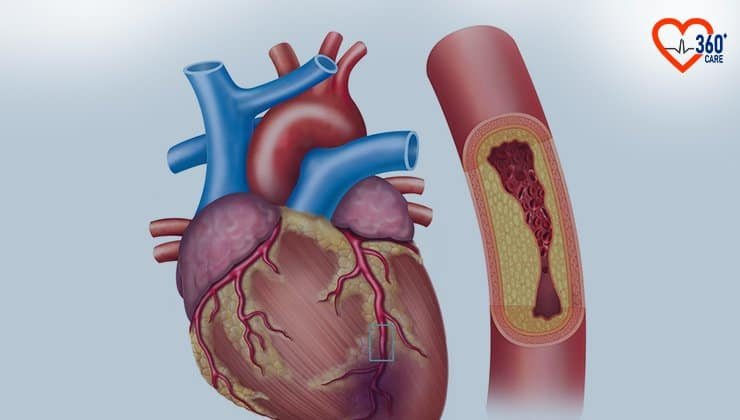Heart blockage can be a life-threatening condition and needs to be treated as soon as possible.
Many patients cannot undergo surgery due to underlying medical conditions and some patients do not wish to undergo a major surgical procedure. Angioplasty and stent placement have emerged as a popular choice for patients who want to remove heart blockage without surgery in 24 hours.
It must, however, be noted that severe heart blockages may need surgical interventions. You should consult a good cardiologist to evaluate your heart health thoroughly and get a proper treatment plan for your condition.
You can get in touch with Dr. Nikhil P.J.Theckumparampil, Consultant Heart Specialist & Cardiac Surgeon at Heart360 Care in Chennai, to diagnose and treat heart blockages with long-term results.
What is Heart Blockage?
A heart blockage refers to a problem in the heartbeat signal moving from the upper part of the heart to the lower part of the heart.
A partial heart block occurs when the electrical impulses are delayed or move more slowly than usual. A complete heart block develops when the electrical signals are stopped completely
What Are the Signs and Symptoms of Heart Blockage?
The symptoms will vary depending on the severity of the heart block present and how it affects the pumping action of the heart. Some common symptoms associated with a heart blockage are:
- Chest pain
- Chest discomfort
- Shortness of breath
- Irregular or slow heartbeat
- Tiredness
- Nausea
- Lightheadedness or dizziness
- Fainting
- Heart palpitations
- Rapid breathing
Causes of Heart Blockage
The various causes of a heart blockage may include:
- Heart attack
- Heart valve diseases
- Coronary artery disease
- Cardiomyopathy (heart muscle disease)
- Congenital problems with the heart structure
- Scarring in the conduction system due to an unknown cause
- Exposure to toxins
- Damage to the heart during open heart surgery
- Side effects of certain medicines like beta-blockers and calcium channel blockers
- Thyroid disease
- Obstructive sleep apnea
- Autoimmune diseases
- Genetic anomalies
- Infections such as Lyme disease
How Can Heart Blockage Be Detected?
The doctor will first evaluate the symptoms and medical history of the patient, and ask about family history, lifestyle, medications, smoking habits, use of recreational drugs, and current medications. The doctor will also listen to the heart, check the patient’s heart rate, and check for heart failure signs, for example, the buildup of fluids in the ankles, legs, and feet.
Additionally, the doctor may recommend undergoing the following tests to confirm the diagnosis of a heart blockage:
- Blood tests
- Electrocardiogram (ECG)
- Genetic tests
- Electrophysiology study
- Loop recorder
- Ambulatory monitor
- Exercise stress test
- Angiography
What is the Best Treatment for Heart Blockage?
The treatment for heart blockage will vary depending on the type and severity of heart blockage present, the symptoms present, and the effect of the blockage on heart function.
In minor cases of heart blockage, changing the medications or treating the heart disease present can stop heart blockage. The various methods that can be used for heart blockage treatment without surgery include:
- Drug therapy: Medications for heart diseases, including hypertension and atherosclerosis medications, hardening of the heart arteries, and thrombolytic medications to break a blood clot that has led to a heart attack can all help in treating a heart blockage.
- Angioplasty and stent placement: It is a quick non-surgical procedure performed to open the blocked arteries in the heart.
- Cardiac rehabilitation: Making healthy lifestyle changes can help treat a heart blockage and prevent future heart diseases.
Major cases of heart blockage may require a surgical procedure, which is as follows:
- Pacemaker implantation (electrophysiology): A temporary or permanent pacemaker may be surgically implanted under the skin of the chest to send electrical pulses to the heart. It is a minor surgical procedure performed under the effect of local anesthesia. The surgeon makes a small incision in the chest wall, directly below the collarbone for pacemaker implantation.
How To Remove Heart Blockage Without Surgery In 24 Hours?
If you are wondering how to clear heart blockage without surgery in a short period of 24 hours, the answer lies in angioplasty and stent placement.
Angioplasty involves the insertion of a balloon-tipped catheter through the arm or groin area and guided to the heart at the site of the blockage. The surgeon will then inflate the deflated balloon to open the blocked artery. Sometimes, a small tube made of wire mesh called a stent, is inserted inside the artery to help it stay open.
However, in some cases, a minor surgical procedure involving pacemaker implantation is needed to remove a heart blockage.
How to Check Heart Blockage at Home?
Although it is not possible to self-diagnose a heart blockage or other heart-related problems at home, you can use some ways to monitor your heart health at home and inform the doctor immediately if you notice any abnormalities. These methods include:
- Blood pressure monitoring: You can keep a blood pressure monitor at home and learn how to measure your blood pressure. The normal blood pressure of a healthy individual is 120/80 mm Hg. However, this value will vary depending on age, health, gender, weight, use of medications, and underlying health conditions.
- Heart rate monitoring: Your heart rate is indicative of how hard your heart is working. You can measure your pulse by placing two fingers on the wrist to count the number of beats felt in one minute. A healthy resting rate is generally between 60 to 100 beats per minute.
- Stair test: According to a study, if you can climb four flights of stairs, which is approximately 60 stairs, in about 90 seconds or less without getting too much out of breath, it could indicate that you have a healthy heart.
Can a Heart Blockage Be Treated with Medicine?
Minor cases of heart blockages can be treated using medications and making some lifestyle changes. The doctor may prescribe a combination of medicines depending on the patient’s symptoms and underlying medical condition.
The various medications that can be prescribed to treat heart blockages include:
- Anti-arrhythmic drugs
- Antiplatelet drugs
- Antihypertensive drugs
- Antihyperlipidemic medications
- Statin medications
- Nitroglycerine and ranolazine
The patient is generally observed for two days after starting the medications and a follow-up electrophysiology study may be needed after that to check the best medication for a particular patient.
What Factors Should Be Considered When Living with a Heart Block?
If you have been diagnosed with a heart block, you need to follow your cardiologist’s recommendations for taking the prescribed medications and use the pacemaker, if you have one.
Follow-up appointments are recommended to ensure that your treatment is working well and check your heart health periodically.
If you have a pacemaker implanted in your heart, you will need to take care of the following things:
- Avoid going near an electrical device or strong magnetic fields to prevent the disruption of the pacemaker.
- Carry a medical card with you at all times carrying details of the type of pacemaker you have.
- If you are visiting a doctor of another specialty, let the doctor know you have a pacemaker in place before undergoing any treatment.
- Get your pacemaker checked regularly to ensure that it is working well.
- Try to stay active, but do not take part in contact sports.
- Wear a bracelet or necklace having medical alerts.
Conclusion
Angioplasty and stent placement are the preferred choice to remove heart blockage without surgery in 24 hours. The procedure is fairly safe and effective. It helps improve a person’s heart health and leads to an improved quality of life.
Book an appointment with Heart360 Care for a thorough assessment of your heart health and undergo successful heart-related procedures.
Frequently Asked Questions
Besides assessing a patient physically and knowing about the symptoms and medical history of the patient, the doctor may recommend undergoing some tests like blood tests, electrocardiogram (ECG), genetic tests, electrophysiology study, loop recorder, ambulatory monitor, exercise stress test, and angiography to confirm the diagnosis of a heart blockage.
Yes, some cases of heart blockage can be treated without surgery using methods like angioplasty and stent placement, making some lifestyle changes, and use of certain medications prescribed by the doctor.
Surgery is needed if you have a blockage in the heart arteries that prevents enough blood from reaching the heart muscle. Usually, surgery will be recommended in the following cases:
1. Blockage in the main left heart artery
2. Severely narrowed main heart artery
3. Severe chest pain that does not improve on taking medicines
4. More than one blocked or narrowed heart artery
5. History of heart attack
6. Angioplasty fails to treat the blocked heart artery
7. More than 50% of blockage detected in the main heart blood vessel or more than 70% of blockage 8. detected in the branches of the coronary arteries
An ECG, which helps record the electrical activity of the heart, cannot directly detect a heart block, but if you have an abnormal ECG, the doctor may suggest undergoing other tests like stress test or angiography to detect a heart block.
The following lifestyle changes can help in preventing heart blockage and maintaining heart health:
1. Exercise regularly
2. Eat a healthy diet
3. Maintain a healthy weight
4. Avoid smoking or use of tobacco
5. Manage stress
6. Get adequate sleep
7. Undergo regular health screenings









